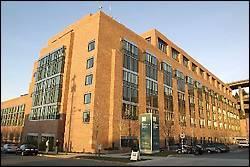|
|
 |
 |
 |
 |
 |
Copyright © 2001 The Seattle Times Company
 |
 |
| Harley Soltes / The Seattle Times |
| The Fred Hutchinson Cancer Research Center. |
PATIENTS DIED PREMATURELY in two failed clinical trials at Seattle's Fred Hutchinson Cancer Research Center — experiments in which the Center and its doctors had a financial interest. The patients and their families were never told about those connections, nor were they fully and properly informed about the risks of the experiments, an investigation by The Seattle Times has found.
The patients in these trials were ill with cancers that, left untreated, would almost certainly have killed them. But many stood a good chance of survival or at least prolonged life with traditional care. Instead, many actually died from the experiments — sooner than they would have with no treatment at all.
This series of articles published March 11-15, 2001, explores the experiments and the complex legal and ethical issues surrounding them. These issues are at the heart of a national debate under way on how medical research is conducted and regulated. Congress will take up the discussion this spring.
|
 |
The Blood-Cancer Experiment
The story of Protocol 126, a blood-cancer experiment at the Fred Hutchinson Cancer Research Center in which at least 20 people died. They were never told that The Hutch and some of its doctors had a financial interest in drugs being tested in the experiment, nor that there were safer, more effective alternative treatments.
|
| |
 |
The Whistleblower
While Protocol 126 went on year after year and more patients died, several doctors tried to raise the alarm. But their complaints went largely unheeded by Hutch officials and, ultimately, by state and federal investigators. |
| |
 |
The Breast-Cancer Experiment
Dying of breast cancer, a Spokane woman agreed to enter a clinical trial at The Hutch. But her doctors didn't tell her several important details, including that there were serious questions about the effectiveness of the drugs she was to be given and that a patient had already died from the treatment. |
| |
 |
The Financier
The man who helped start Seattle's biotechnology industry, including several companies run by doctors from The Hutch, is now a convicted felon. |
| |
 |
The Prospects for Change
What's happening around the country to reform clinical trials and how the culture of The Hutch resists such change. |
|
|

